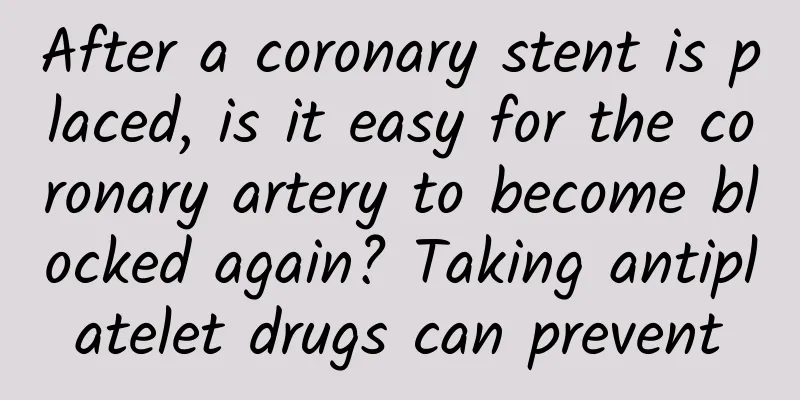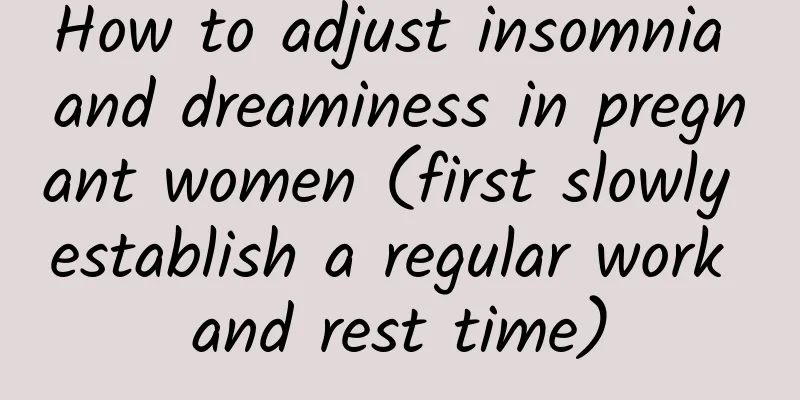After a coronary stent is placed, is it easy for the coronary artery to become blocked again? Taking antiplatelet drugs can prevent

|
A patient with coronary heart disease told Huazi that he had 4 stents placed in his heart a year ago, but recently he had chest tightness and shortness of breath again. Coronary angiography showed severe stenosis in the stents again, and the doctor recommended that he continue with the stent surgery. He asked Huazi, after the coronary artery was stented, is it easy to get blocked again? Then what is the point of stenting? When Huazi asked him about his medication, he discovered a problem. He was supposed to use aspirin and clopidogrel for "dual antiplatelet" treatment after the operation, but after 4 months of medication, he stopped taking aspirin because he was worried about the side effects of aspirin and only used clopidogrel. Huazi told him that the problem might lie here. 1. Heart stents cannot be a one-time solution The cause of coronary heart disease is atherosclerosis in the coronary arteries. If drugs are not used in time to control the progression of atherosclerotic plaques, it will cause severe stenosis of the coronary arteries, affecting the blood supply to the heart, and causing angina symptoms such as chest tightness and chest pain. The patient's daily activities will be restricted and the quality of life will be greatly affected. It is difficult to reverse atherosclerotic plaques with drugs. The main method to relieve the symptoms of coronary heart disease is to restore the blood supply to the heart by surgically inserting a stent or bypassing the coronary artery. However, this surgical method cannot "solve the problem once and for all" because the condition of coronary atherosclerosis is still progressing, so it is still necessary to insist on taking drugs and living a healthy lifestyle, otherwise the coronary artery may narrow or become blocked again. 2. “Dual Antibody” Therapy to Prevent In-Stent Stenosis Plaque rupture can induce platelet aggregation and thrombus formation, and the heart stent itself is a foreign body, which can also induce platelet aggregation and thrombus formation. Therefore, after the interventional surgery, a period of intensive antiplatelet therapy is required to reduce the risk of thrombus formation after the surgery. Enhanced antiplatelet therapy is to use two antiplatelet drugs, such as aspirin plus clopidogrel, or aspirin plus ticagrelor, for "dual antiplatelet therapy". The drugs need to be continued until the arterial intima completely covers the stent, and then one drug is discontinued and switched to single antiplatelet therapy. 3. “Dual Antibody” Time in Different Situations Simple balloon or drug-eluting balloon dilatation: There is no foreign body left in the blood vessel. Usually, "dual antiplatelet" treatment is sufficient for about 1 to 3 months, and then switched to single antiplatelet treatment. Bare metal stent: It takes about 3 months for the arterial endothelium to cover the surface of the stent, so the "dual-antibody" treatment needs to last about 3 months, and then be changed to single-drug treatment. Drug-eluting stent: There is a drug coating on the surface of the stent, which can inhibit the proliferation of the arterial intima, thereby reducing the risk of restenosis within the stent, but it will also prolong the time that the intima covers the stent, so about 1 year of "dual antibody" treatment is required. The above are all theoretical "dual anti-treatment" times. The actual "dual anti-treatment" time needs to be decided by the doctor based on the patient's condition and risk. Usually, patients with acute coronary syndrome need a "dual anti-treatment" period of about 1 year, and the medication cannot be reduced in advance. Because the atherosclerotic plaques in the coronary arteries of these patients are likely to be in an unstable state and prone to rupture, which will induce platelet aggregation to form thrombi, so it is necessary to strengthen antiplatelet therapy to obtain better protection. 4. Follow the doctor's advice and take medication regularly After having a heart stent, patients with coronary heart disease must follow the doctor's advice and take "dual-antibody" drugs regularly, which is the key to preventing restenosis of the coronary artery. If side effects occur during the "dual-antibody" period, contact the doctor in time to seek solutions, rather than stopping the drugs without authorization. While taking medication, you should also maintain a healthy lifestyle, eat a low-cholesterol diet, quit smoking and drinking, and obese people need to lose weight. People with "three highs" need to use appropriate therapeutic drugs to control blood pressure, blood lipids, and blood sugar. If possible, maintain regular exercise to promote recovery from the disease. To sum up, heart stent surgery cannot be a "once and for all" solution. After the surgery, you must pay attention to "dual-antibody" treatment and do not stop taking the medication without authorization. At the same time, you must actively control chronic diseases and maintain a healthy lifestyle, otherwise re-stenosis is likely to occur. If you find any problems during medication, consult your doctor or pharmacist in time. I am pharmacist Huazi. Welcome to follow me and share more health knowledge. |
<<: How does gender bias shape the brain?
Recommend
What should I do if my endometrium is thick and I don't have my period?
Thick endometrium will affect the onset of menstr...
Nosebleed after taking medicine
If nosebleeds occur after medical abortion, it is...
Pregnant women's legs are swollen, is it time to give birth?
Pregnant women are prone to physical problems aft...
What is the best drink for women to replenish qi and blood?
For a woman, if both Qi and blood are deficient, ...
The difference between caesarean section and natural birth
Caesarean section and natural birth are two diffe...
[Medical Q&A] Why do some people go to a smoking cessation clinic to quit smoking?
Planner: Chinese Medical Association Reviewer: Xi...
Norovirus "strikes" suddenly, read this article to learn how to protect the health of your family
As the Spring Festival holiday comes to an end, p...
Why doesn't my boyfriend's circle of friends go public? What's a good way to get him to show his affection?
After many girls fall in love, they find that the...
What to do if your vagina is dry
Many women will find that they have vaginal dryne...
Pictures of cervical erosion of the first, second and third degrees
The symptoms of first, second and third degree ce...
What is "explosive lung"? Learn about this health hazard from this article!
Well-known singer Khalil Fong died of illness on ...
Can pregnant women drink honey water every day?
Honey lemon water can help us promote digestion, ...
What car is the flying man logo? Why is the Wuling Hongguang logo so popular?
Rolls-Royce is the world's top luxury car man...
Will it hurt a lot to induce labor at 4 months?
The harm of induced abortion is quite large. Some...
What is vulvitis
Gynecological diseases are diseases related to th...









